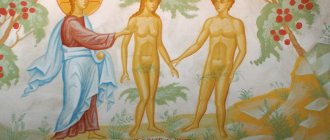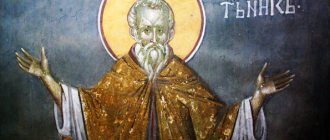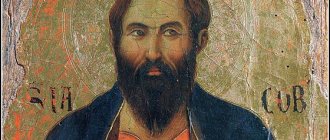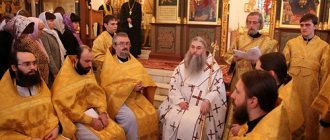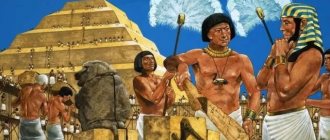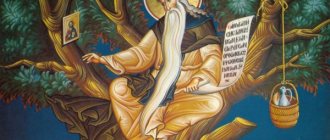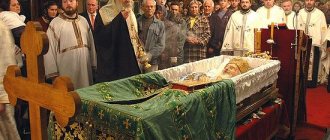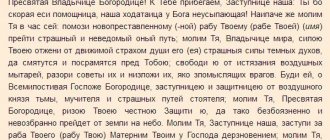The biblical parable of Jacob and Esau is the story of how a world of hatred, division, violence, anger and mistrust is transformed into a world of harmony, brotherhood, reciprocity and harmony. It is also the story of two brothers, telling us how they managed to change and reconcile after years of hostile separation.
Abraham's son Isaac married Rebekah and they had no children for twenty years. Finally, after prayer, Rebekah conceived twins who fought in her womb. At this time, she received a prophecy from God: “Two tribes are in your womb, and two different nations will come from your womb; one people will become stronger than the other, and the greater will serve the lesser.” Isaac and Rebekah gave birth to twins, who were named Esau and Jacob. Esau was born first, and therefore he was the older brother. When the boys grew up, Esau became a skilled hunter, and Jacob was a meek man who lived in tents. Isaac loved Esau because he liked game, and Rebekah loved Jacob. One day Jacob cooked some stew, and Esau came home from the field hungry. He said to Jacob, “Give me this lentil soup to eat! I'm starving!" Jacob replied, “Sell me your birthright.” “Behold, I am dying,” said Esau, “what is this birthright to me?” Jacob said, “Swear to me now.” Esau swore an oath to his brother and sold him his birthright. Then Jacob gave Esau bread and lentil stew. He ate, then got up and walked. So Esau despised his birthright. When Isaac grew old, he said to his eldest son Esau: “I am now old and blind, and I do not know the day of my death. Go catch me some game and prepare me the food that I love, and bring me something to eat so that I can bless you before I die.” Rebekah heard these words. When Esau left, she told Jacob to take two kids so she could prepare Isaac's favorite dish. Then Jacob had to pretend to be Esau and take food to his father in order to receive his blessing himself. Jacob did not want to do this, but his mother persuaded him. Jacob, pretending to be Esau, went to his father and said: “I am Esau, your firstborn. I did as you told me. Eat my game so you can bless me.” After eating, Isaac blessed him and said: “May God give you from the dew of heaven and from the fatness of the earth, and plenty of bread and wine. May the nations serve you, and may the nations worship you. Be lord over your brothers, and let your mother’s sons worship you.”
As soon as Isaac finished the blessing and Jacob left his father, Esau appeared from the hunt. He also prepared a delicious dish and brought it to his father. Then he said: “Father, sit down and eat my game, so that you can bless me.” “Who are you?” asked Isaac. “I am your son, your firstborn, Esau,” was the answer. And Isaac trembled and asked: “Who is this that took out the game and brought it to me? And I ate before you came and blessed him.” Esau, after listening to his father’s words, grumbled. Isaac said: “Your brother came with cunning and took your blessing.” Esau could not hide his anger at his younger brother: “He has deceived me twice already! He took my birthright, and now he took my blessing.” Esau harbored a grudge against Jacob because of the blessing his father had bestowed upon him. He said to himself: “Soon father will die; and then I will kill my brother Jacob." When Rebekah heard Esau's words, she sent Jacob to her brother Laban so that he could escape danger and find a wife. On the way there, Jacob had a dream that God would protect him and that he would return to his father's house in peace.
Laban had two daughters: the eldest was named Leah, and the younger was Rachel. Unlike her older sister, Rachel was very beautiful. Jacob immediately fell in love with Rachel and said to her father: “I will serve you seven years for Rachel, your youngest daughter.” Laban agreed, and Jacob served for seven years to get Rachel as his wife, but they appeared to him in a few days because he loved her. When the seven years were up, Laban held a wedding feast for Jacob. However, the next morning Jacob woke up and saw next to him not Rachel, whom he loved, but Leah. Jacob became very angry. But having learned that, according to local custom, the eldest daughter should marry first, he agreed to serve for another seven years for Rachel. During this time, Jacob was deceived by his uncle many times. Nevertheless, Jacob prospered, his family grew, he acquired large herds, servants, and camels. Twenty-one years have passed. Jacob again dreamed that it was time for him to return to his homeland. Having received Laban's blessing, he took his family and property and set off on his way back.
Jacob was afraid of meeting Esau. And he sent messengers ahead of him to meet Esau. The messengers returned and told Jacob that Esau had come out to meet him, and with him four hundred men. Jacob was frightened and began to pray: “God of my father Abraham and God of my father Isaac, Lord, who said to me: return to your land, but your homeland, and I will do good to you! I am unworthy of all the mercies and all the good deeds that you have done to your servant, for I crossed this Jordan with my staff, and now I have two camps. Deliver me from the hand of my brother Esau, for I am afraid of him, that he will come and kill me and the mothers and children. You said: I will do good to you, and I will make your descendants like the sand of the sea, which cannot be numbered.” The next day, Jacob brought Esau a gift of two hundred goats, twenty sheep, thirty she camels, fifty cows and bulls, and thirty donkeys. With each herd Jacob sent a slave, and thought: “I will appease him with the gifts that go before me, and then, when I see him, maybe he will accept me.”
The next morning, Jacob and his family went to meet Esau. Seeing his brother, he came forward and bowed to the ground seven times. And Esau ran to meet him, and embraced him, and threw himself on his neck. And they cried. Then Esau looked at the women and children and asked, “Who is this with you?” Jacob answered: “The children whom God has given to your servant.” And the maidservants came up with the children and bowed down. Then Leah and her children came up and bowed. Finally, Rachel and Joseph came and bowed, and Esau asked, “Why do you have this multitude that I met?” Jacob said, “To gain favor in your sight, my lord.” But Esau said, “I have much, my brother. Let it be yours." Jacob replied: “No, if I have gained your favor, accept my gift. Because I saw your face as if it were the face of God, and you were favorable to me. Accept the gift that I brought to you, because God has given it to me, and I have everything. And he begged him, and he took it.
Questions to think about.
- Just like the parable of Cain and Abel, the story of Jacob and Esau has much to teach us. This is not just another biblical legend. If we think about the reasons for the actions of the two brothers and try to correlate them with our own attitude towards people, then we will be able to see many of our actions in a new way and find wiser ways to resolve conflicts that arise in our lives. So let's look at the story of Jacob and Esau.
- Why did Esau sell his birthright? Do you think there should be priorities in our lives that determine what is most important to us and what is of secondary importance?
- Was Jacob right to receive the blessing? Could this have been done differently?
- When you strive to achieve a goal that seems fair and justified to you, do you consider it acceptable to use any means?
- Was Esau right to want to kill Jacob? Imagine that someone has seriously offended you. What will you do? Will you do anything out of a desire to take revenge on the offender? Do you think such a desire will be justified?
- Why didn't Jacob stop serving his uncle, who treated him so badly?
- What do you do if you seriously offended one of your friends, and then moved to another city, and you don’t even have the opportunity to apologize to this person?
- Why did Jacob go home, knowing that Esau might still want to kill him? Do you think that if a serious conflict occurs in a relationship between people, can it be resolved “by itself” over time? Does the person who caused the conflict have the right to forgive himself over the years?
- Why did Jacob's gifts and attitude make such a strong impression on Esau?
- Imagine that you are in a conflict with one of your friends or parents. What do you think can convince this person of the sincerity of your desire for reconciliation? Is it enough to just buy an expensive gift? How can the example of Jacob and Esau help us today in solving problems that arise in human relationships?
- Is this example instructive only in terms of personal relationships, or can this approach also be used in relationships between groups of people and even between countries?
- What can we learn from the story of Jacob and Esau?
Reading the parable of Cain and Abel, we saw that Cain could not cope with his anger and killed his brother. The story of Jacob and Esau could very well have ended the same way. What's the difference?
How to deal with anger
The reconciliation between Jacob and Esau happened because both brothers changed. When Jacob took both the birthright and the blessing through trickery and deceit, he did not think about how Esau felt. Only in Haran, having experienced Laban's cunning and deceit, was he able to understand how he himself must have offended his brother. If Jacob had behaved the same way towards Laban, wanting his death or ruin, there would have been no talk of any reconciliation. Fortunately, despite the fact that he was treated unfairly, Jacob did not complain and did not harbor any malice that could poison his soul. Instead, he forgave his uncle and served him diligently, even though Laban deceived him many times. Jacob's deep love for Rachel helped him endure and overcome all trials. Through the suffering he had to endure, his heart and soul were purified and strengthened. Isn't it true that when we are treated unfairly, we often begin to be offended, angry and complain, blaming our enemies for everything? However, it is better to stop and think. We can think about our past life and remember a time when we ourselves were unfair to someone. Perhaps we are simply reaping what we have sown? Even if we cannot remember any unrighteous deeds, revenge will not solve anything. It will increase injustice, and besides, our character will only become worse.
Abraham
Abraham lived in the country of the Chaldeans, not far from Babylon. He was a descendant of Shem and, with his entire family, retained true faith in God. He was rich, had a lot of cattle, silver and gold, and many servants; but had no children and grieved about it.
God chose righteous Abraham to preserve the true faith, through his descendants, for all mankind. And in order to protect him and his descendants from his native pagan people (because among his native pagan people it was more likely to learn idolatry), God appeared to Abraham and said: “Get out of your land and from your father’s house to the land that I will show you.” . I will make you into a great nation and I will bless you and make your name great. And in you all the families of the earth will be blessed
", that is, in this people - in its descendants, over time, the Savior of the world promised to the first people will be born, Who will bless all the peoples of the earth.
Abraham was seventy-five years old at that time. He obeyed the Lord, took his wife Sarah, his nephew Lot and all the property that they acquired, all his servants, and moved to the land that the Lord showed him. This land was called Canaan
and was very fertile. The Canaanites lived there at that time. This was one of the most wicked peoples. The Canaanites were descendants of Canaan, the son of Ham. Here the Lord again appeared to Abraham and said: “All the land that you see I will give to you and your descendants.” Abraham built an altar and offered a thanksgiving offering to God.
After this, the land of Canaan began to be called the promised land
, that is, promised, since God promised to give it to Abraham and his descendants.
And now it is called Palestine
. This land is located on the eastern shore of the Mediterranean Sea, and the Jordan River flows through its middle.
When the herds of Abraham and Lot multiplied so much that they became crowded together and incessant disputes began to occur between their shepherds, then they decided to disperse amicably.
Abraham said to Lot: “Let there be no discord between us, since we are relatives. Is not the whole earth before you? Separate yourself from me; If you go to the right, then I will go to the left.”
Lot chose the Jordan Valley for himself and settled in Sodom. But Abraham remained to live in the land of Canaan and settled near Hebron, near the oak grove of Mamra. There near the oak of Mamri
, he pitched his tent and built an altar to the Lord. This Mamrian oak still grows in Palestine, near the city of Hebron.
Not long after Lot settled in Sodom, the neighboring king of Elam attacked Sodom, destroyed the city, and took captives both people and property. Lot was among the captives.
Abraham, having learned about this, immediately gathered his servants (318 people), invited his neighbors to help, caught up with the enemy, attacked him and recaptured all the booty.
When Abraham returned, he was greeted with triumph. Melchizedek
, who was
the priest of the Most High God
and
the king of Salem
, brought Abraham a gift
of bread
and
wine
and blessed him.
Nothing is known about Melchizedek - his origin and death. Name Melchizedek
means
king of righteousness
: the word
salim
means
peace
.
Melchizedek prefigured Jesus Christ: just as Melchizedek was both priest and king, so Jesus Christ is High Priest and King. Just as about Melchizedek neither the beginning nor the end of his life is indicated - he is, as it were alive forever
- so Christ is the eternal God, King and High Priest; and we call Jesus Christ High Priest forever, according to the order of Melchizedek. And just as our Lord Jesus Christ gave us His body and blood, that is, St., under the guise of bread and wine. communion, so Melchizedek, prefiguring the Savior, brought bread and wine to Abraham, and, as the eldest, blessed Abraham.
Abraham reverently accepted Melchizedek's blessing and gave him a tenth of his spoils.
Note
: see the Bible, in the book. "Genesis": chapters
12, 14, 15, 16, 17.
Redemption
What should we do if someone is angry with us? Unfortunately, this happens quite often in life: we have angered someone with our words, actions, or someone in a bad mood takes it out on us. If you do not make efforts to resolve this situation, a good relationship can easily deteriorate and gradually fade away. For example, if we accidentally offended someone, it is enough to ask for forgiveness, and everything will be forgotten. If, for example, we broke a very beautiful and expensive crystal vase, then an apology will probably not be enough, and we will have to replace the broken thing with something as a sign of our sincerity. Either way, we must do something to repair the damage caused. This effort to overcome conflict, to eliminate the mistake we have made, is called atonement. At the same time, it is necessary to remember that if we want to truly atone for our guilt, then it is not so much the words of apology or expensive gifts that are important, but the sincerity of our hearts.
To restore his relationship with his brother, Jacob had to first change himself in order to realize why Esau was so angry with him. Then he had to fall in love with a brother who wanted to kill him. As a sign of this changed attitude, Jacob brought his brother a large gift from what he had earned over the years, and he did this not arrogantly, but humbly and generously. That is why Esau did not even want to accept the gift - all past grievances and anger were washed away by Jacob’s sincerity of heart. Esau also changed. He did not kill Jacob and did not accept his gift as compensation that was rightfully due to him. His heart was quite open - he was touched by Jacob's gifts and attitude, and he wished for reconciliation. Jacob's love was stronger than Esau's hatred.
Esau and Jacob. Joseph. Job. Egyptian slavery.
Author: Slobodskoy Seraphim, Archpriest
Esau and Jacob
Isaac had two sons: Esau and Jacob.
Esau was a skilled trapper (hunter) and often lived in the field; Jacob was meek and quiet, living in tents with his father and mother.
Isaac loved Esau more, who pleased him with food from his game, and Rebekah loved Jacob more.
Esau, as the eldest son, had the birthright, that is, the advantage over Jacob in blessing from his father.
But one day Esau returned from the field tired and hungry. At this time, Jacob was cooking himself some lentil stew.
And Esau said to him: “Give me something to eat.”
Jacob said: “Sell me your birthright,” because he really wanted the blessing given by God to Abraham to apply to him, and thereby zealously serve God.
Esau replied: “Behold, I am dying of hunger, what is this birthright to me?” With this answer, Esau showed his disdain for the blessing of God.
Jacob said, “Swear.”
Esau sells his birthright to Jacob for lentil stew
Esau swore an oath and sold his birthright to Jacob for a pot of lentils.
When Isaac grew old and blind, then, feeling that his life was coming to an end, he wanted to bless Esau as his eldest son. But, thanks to a trick arranged by Rebekah, he blessed Jacob instead of Esau. Isaac soon learned his mistake, and despite this, he still confirmed his blessing for Jacob.
For this, Esau hated his brother and even wanted to kill him, so Jacob had to leave his family.
On the advice of his parents, he went to his mother’s homeland in Mesopotamia, in the land of Babylon, to her brother Laban, to live with him until Esau’s anger passed, and at the same time to marry one of Laban’s daughters.
NOTE: See the Bible, in the book. "Genesis": ch. 23; 24; 25; 27, 1-9.
Jacob's vision of the mysterious staircase
On the way, Jacob stopped in a field to spend the night, put a stone under his head and fell asleep. And so, he sees in a dream: there is a ladder on the ground, and its top touches the sky. Angels of God ascend and descend along it, and at the top of the stairs stands the Lord Himself.
And the Lord said to Jacob: “I am the Lord, the God of Abraham and Isaac. Don't be afraid! The land on which you lie I will give to you and your descendants. And your descendants will be as numerous as the sand of the earth, and in seed all the nations of the earth will be blessed. And behold, I am with you, and I will keep you wherever you go, and I will bring you back to this land.”
Here under the seed or his descendant, through whom all nations will be blessed, that is, made happy, is, of course, the Savior. The staircase that connected heaven with earth prefigured the Mother of God , through whom the Son of God, born from Her, descended to earth to save people. The Mother of God, like that ladder, connected heaven with earth.
Waking up, Jacob said: “This place is terrible: this is the house of God, this is the gate of heaven.” He set up the stone on which he slept as a monument and poured oil (oil) on it as a sacrifice to God. He called this place Bethel , which means: the house of God . After this, with the hope of God's help, he calmly continued his journey to Mesopotamia.
Jacob came to Harran to Laban, to his mother's brother (that is, to his brother-in-law, or otherwise, to the schwager). Jacob told Laban everything and stayed to live and work with Laban.
Laban asked Jacob what kind of payment he wanted for his work. Jacob agreed to work for Laban for seven years for his daughter, Rachel , so that he could later marry her, because he fell in love with her.
But Laban cunningly gave Jacob not Rachel as his wife, but his eldest daughter Leah , justifying himself by saying that this was the local law, so as not to give the youngest daughter before the eldest.
Then the deceived Jacob agreed to work for another seven years for Rachel .
Twenty years later, Jacob safely returned to his father, to the land of Canaan, with a large family and property. Esau, who had not seen his brother for a long time, joyfully met Jacob on the way.
The Lord, under special mysterious circumstances, having tested the strength of Jacob, gave him a new name Israel , which means “God-fighter.” And Jacob became the ancestor of the people of Israel , or, what is the same, the Jewish people .
NOTE: See the Bible, in the book. "Genesis": ch. 28, 10-22; 29; 30; 31; 32; 33; 34; 35.
Joseph
Jacob had twelve sons: Reuben, Simeon, Levi, Judah, Issachar, Zebulun, Dan, Naphtali, Gad, Asher, Joseph and Benjamin. From them later came the twelve tribes, or tribes, of the Jewish people.
Of all his sons, Jacob loved Joseph most of all for his meekness and obedience and sewed him a coat of many colors. The brothers began to envy Joseph and hated him.
One day Joseph had a dream that he and his brothers were in the field knitting sheaves. And so his sheaf stood upright in the middle, and the sheaves of the brothers surrounded his sheaf and bowed to him. Another time Joseph dreamed that the sun, moon and eleven stars bowed down to him. When he was telling his dreams, his father remarked to him: “What kind of dreams are these? Shall I and your mother and brothers bow down to you? The brothers began to hate Joseph even more.
Soon after this, the brothers were tending flocks far from home, and Joseph's father sent Joseph to visit them and find out if his brothers were healthy and if the cattle were safe. When he approached them, the brothers saw Joseph from afar and began to say: “Here comes the dreamer, let’s kill him and then see how his dreams come true.” But Reuben, the eldest of the brothers, said: “Do not shed blood; You’d better throw him into the ditch.” And then he thought of saving Joseph and returning him to his father. The brothers obeyed; They stripped Joseph of his coat of many colors and threw him into a deep ditch with no water in it. At this time, merchants were passing by them with goods to the land of Egypt. One of the brothers, Judah, advised them to sell Joseph, and they sold him for twenty pieces of silver. Then they took Joseph’s robe, smeared it with the blood of the kid, brought it to their father and said: “We found this robe, isn’t it Joseph’s?” Jacob recognized the clothes. “That’s right, a wild beast tore Joseph to pieces!” he exclaimed with grief. Then he mourned his beloved son for a long time and could not be consoled.
Selling Joseph by his brothers
Joseph, sold by his brothers (on the advice of brother Judas) for 20 pieces of silver, was a prototype of Christ, sold by Judas for 30 pieces of silver.
NOTE: See the Bible, in the book. "Genesis": ch. 37 ; and book "Exodus": ch. 1 , 1-4.
Joseph in Egypt
The merchants brought Joseph to Egypt and sold him to a courtier named Potiphar (or Pentephria). Living in Egypt, among the pagans, Joseph firmly maintained his faith in the true God and was afraid of sinning in anything before Him; served his master honestly. Potiphar fell in love with him and made him manager of his house. But Potiphar’s evil and treacherous wife slandered Joseph before her husband. Potiphar believed his wife and put Joseph in prison.
But God saw Joseph's innocence and helped him. In the same prison were the butler and baker of Pharaoh, the king of Egypt. One day they had dreams. The cupbearer dreamed that he picked berries from three grapevines, squeezed the juice from them into a bowl and served them to Pharaoh. The baker saw that he was carrying three baskets of bread on his head, and birds were flying in and pecking from them. Joseph explained these dreams. He told the cupbearer that in three days the Pharaoh would forgive him, and he would again be a cupbearer, and he said to the baker that in three days the Pharaoh would order him to be hanged, and the birds would peck at his body. And everything happened as Joseph said.
Two years after this, Pharaoh saw two special dreams in one night. He dreamed that he was standing on the bank of a river, and behold, first seven fat and beautiful cows came out of the river, and behind them seven skinny cows; The skinny cows swallowed up the fat ones, but they themselves did not become fatter. Another dream is that seven full ears grew on one stalk, and then seven dry and skinny ears, and the skinny ears swallowed up the seven full ears. In the morning, Pharaoh called all the wise men of Egypt, but none of them could interpret his dreams.
Then the cupbearer remembered Joseph and told the king about him. Joseph was brought to Pharaoh and he explained the dreams. “Both dreams,” he said, “mean the same thing: behold, seven years of plenty will come in the land of Egypt; after them there will come seven years of famine.” At the same time, Joseph gave Pharaoh advice to prepare enough grain during the harvest years to last throughout the famine.
Pharaoh realized that God Himself revealed to Joseph the meaning of dreams, and made him the chief commander in the land of Egypt, the first after himself, and instructed him to prepare bread,
NOTE: See the Bible, in the book. "Genesis" ch. 39; 40; 41, 1-46.
Joseph's meeting with his brothers and Jacob's migration to Egypt with his family
In seven fertile years, Joseph collected so much grain in Egypt that there was enough for the famine years, and it could even be sold to other countries. People from everywhere began to come to Egypt for bread, because there was famine throughout the entire land.
The sons of Jacob from the land of Canaan also came to Egypt for bread. They came to Joseph, bowed to the ground, but did not recognize him. Joseph recognized the brothers and involuntarily remembered the dreams of his childhood; but in order to see whether the brothers had become better, he treated them harshly and said to them: “You are probably spies (foreign scouts), you came to spy out everything in our land in order to later conquer it.”
“No,” answered the brothers, “we are honest people and all the sons of one man in the land of Canaan. There were twelve of us, but one of us was gone, and the youngest remained with his father.”
“If you are telling the truth,” said Joseph, “then let one of you stay here, and let the rest take the bread and bring the younger brother.”
The brothers then began to talk among themselves, thinking that Joseph did not understand them, since he spoke to them through an interpreter: “Behold, we are suffering punishment for sin against our brother. We did not spare him, but such grief befell us.”
Joseph, when he heard what they were saying, walked away from them and began to weep. Then he kept Simeon with him and sent the other brothers away.
A year later, the brothers again came to Egypt for bread and brought with them their younger brother Benjamin. Joseph, seeing Benjamin among them, ordered them to be brought into his house and arranged a dinner for them. And when he looked at Benjamin, he shed tears of joy. So that his brothers would not notice his tears, he went into another room and washed his face. After dinner, Joseph ordered bread to be poured into their sacks, and in Benjamin’s sack he ordered to put the silver cup from which he himself drank. The next morning he sent them home.
But as soon as the brothers left, Joseph ordered his steward to catch up with them and search them to see if they had stolen the cup. The cup was found in Benjamin's bag. The brothers all returned to Joseph, fell to the ground before him and said: “God has revealed our iniquity; now we are all your servants.”
“No,” answered Joseph, “let the one who found the cup remain a slave, and you can return to your father.”
Then Judah stepped forward and said to Joseph: “My lord! Our father is old and loves this son more than anyone; I promised to bring him back safely; Let me better remain your slave instead of him, and let him go with his brothers to his father; because if he doesn’t return, our father will die of grief.”
Now Joseph saw that his brothers had reformed, and he no longer began to hide from them. He sent out all the servants, cried and said to them: “I am your brother Joseph, whom you sold into Egypt!”
Joseph reveals himself to his brothers
The brothers were so embarrassed that they could not speak.
But Joseph continued: “Do not be afraid! God Himself brought me here to save your life. Go quickly to your father and tell him to go to Egypt to join me, because there are still five years of famine left.” Then he began to hug and kiss Benjamin and all the brothers and cried, hugging them.
When Jacob learned with great joy that his son Joseph was alive, he moved with his entire family to Egypt.
The elderly Jacob-Israel lived for seventeen years in Egypt and began to approach death. First he blessed Joseph and his children, Manasseh and Ephraim. Joseph brought his sons to their father so that the eldest Manasseh stood opposite the right hand of Jacob, and the younger Ephraim stood against the left. But Jacob folded his hands in a cross so that his right hand lay on Ephraim’s head, and his left on Manasseh’s head. And he blessed them: Ephraim as the eldest, and Manasseh as the youngest.
This cross-shaped folding of hands by Jacob for blessing was a prototype of the Cross of Christ and the time when people will receive the blessing of the Lord not according to seniority, but according to their good deeds and merits.
Then, having gathered all his sons around the bed, he gave a blessing to each of them and predicted to Judas that from his descendants there would be kings over the Jewish people until the Reconciler, that is, Christ the Savior, comes.
After all, he commanded his sons to bury him in the land of Canaan, where his fathers were buried. And Jacob Israel died a hundred and forty-seven years old, and was carried by his sons to the land of Canaan and buried there.
Jacob and his family moved to Egypt
Fifty years after Jacob, Joseph also died. Before his death, he said that God would lead the Jewish people out of Egypt and return them to the land of Canaan. He also commanded that his bones be transferred to his native land.
In Egypt, the family of Jacob-Israel soon multiplied and formed a people who began to be called Israelite or Hebrew . It was divided into twelve tribes according to the number of the twelve sons of Jacob.
Joseph's story
, who suffered from his brothers, then became famous and saved their lives, was a prototype of Christ the Savior. The Savior also suffered from his people, died on the cross, then rose again and became glorified, and saved people from sin and eternal death.
NOTE: See the Bible, in the book. "Genesis": ch. 41, 47-57; Ch. 42 to 50 ch.
Conversation: The Story of Joseph Written in the Language of Trees
Rationalists (people who recognize only one mind as the source of knowledge, reject all experience and Divinity. Revelation), who do not believe in the historicity of biblical stories, treat the story of Joseph as a legend. However, this story is not a legend, but a real event that took place in the history of ancient Egypt. The author of these lines boldly asserts the historicity of this event, since it turned out to be recorded by nature itself and recorded in a completely unexpected way. In the twenties of the current century, the author studied the dependence of tree growth on various natural factors: irrigation, precipitation, climate, fires, pests, in connection with the work of many researchers in Russia, America and Sweden. At the same time, a survey of wood remains preserved in various paleontological and archaeological collections was carried out. Our attention was especially drawn to the collections of wooden objects preserved from the times of ancient Egypt. There were a significant number of such objects in the Egyptian department of the St. Petersburg Hermitage. All of them were in excellent condition, making it possible to determine exactly what kind of wood was used for this or that thing.
Thus, it was found that some of the things were made from trees that grow to this day in Abyssinia and in the areas of the upper lakes, where the Blue and White Nile originates. These breeds were, of course, imported to Egypt. But not a small number of things in the collection were made from tree species that still grow in the Nile Valley. Among these species, two species were most often used by carpenters of ancient Egypt: Nile acacia and sycamore. By studying the structure of the wood of these species, we were able to establish that there is a direct relationship between the width of tree rings and the floods of the Nile.
As you know, the entire economy of Egypt depends on the magnitude of these floods: when the flood is heavy, the entire population prospers, since the vegetation of the Nile Valley develops rapidly in such years, the fields produce a bountiful harvest; It turned out that in such years the trees growing along the banks of the Nile form wide rings. In years of weak floods, there is shortage of food and famine in the country, and the tree rings become narrow, since all vegetation suffers from lack of moisture. When the connection between harvests and the width of tree rings was established, I came to the following conclusion: if the biblical account conveys an event that actually took place in the history of Egypt, then 7 years of extraordinary harvests and seven years of severe crop failures should have been imprinted in the rings growing on that time. banks of the Nile, trees.
Then I asked the assistant curator of the Egyptian Department of the Hermitage (in those years he was Academician V.V. Struve), Mrs. N.D. Flitner, to indicate to me which wooden items from the collections can be dated back to the XIII-XVIII dynasties? Biblical archeology researchers, as is known, date the history of the Jews in Egypt to this era. Ms. Flitner pointed out a number of such things to me. Among them were: a box for storing incense made from Nile acacia, a sarcophagus of one of the princesses, hollowed out from a sycamore tree, and some other objects. I made a thorough examination of these objects, starting with the incense box. This is a small thing, approximately 12 cm long, 7 cm wide and 8 cm deep. (At one time I took precise measurements and photographs, but they died during the flight from the USSR). This box was made from the same stump of Nile acacia. The master cut the stump into thin planks, from which the box was glued together using plant resin. The identity of the pattern of the wood layers was visible on all the walls of the box, and this pattern turned out to be exceptional: on all the boards the presence of very wide and very narrow layers was striking. This alternation went like this: first there was a group of six unusually wide layers; and immediately following her was a group consisting of seven very narrow layers. (The sequence of layers in time can be established without much difficulty by anyone who is familiar with the structure of the so-called spring and autumn wood). We said above that the width of the tree layers on the banks of the Nile corresponds to its floods and the associated harvests or crop failures. Thus, nature itself recorded that during the time corresponding to the era of Joseph’s life in Egypt, abundant harvests took place in this country for several years in a row. During these years, the trees also formed unusually wide rings. There were six such growth rings on the box we examined. But even before these, the rings were not narrow, so there is no noticeable discrepancy with the biblical story of the seven years of plenty. Regarding the seven years of crop failure that followed the years of harvests, the structure of the wood we examined testifies with irrefutable accuracy.
In addition to the aforementioned box, I also examined the above-mentioned sarcophagus. Its state of preservation was somewhat worse than that of the incense box, but nevertheless, on the sycamore wood, from the trunk of which the sarcophagus was made, it was possible to discover a similar group of layers, confirming with irrefutable clarity that the basis of the biblical story is an undoubted fact recorded on the pages great book of Nature.
I reported the discovery, in general terms, in a public report at an evening in memory of D.N. Kaigorodov in February 1928 and tried to publish it with the attachment of all the materials obtained from the research. This was not possible, since the censorship conditions existing in the USSR do not allow the printing of anything that could help increase the authority of the books of Holy Scripture.
To what has been said, I consider it useful to add information related to the history of ancient Egypt.
According to biblical chronology, the sale of Joseph by his brothers to Egypt and the subsequent resettlement of Patriarch Jacob there took place 18 centuries before the birth of Christ. Some historians establish the exact date of Jacob's migration, namely 1825. It is remarkable that under the pharaohs of the XII dynasty, in particular under Amenemhat III, who reigned during these years, the artificial irrigation network was significantly expanded and improved. The water level in the Nile under the pharaohs of the XII dynasty was noted on the rocks near Semne, at the 2nd cataract. The inscription discovered here and dating back to the 14th year of the reign of Amenemhet (i.e., 1835 BC) notes the maximum level, which was 7 meters higher than the water level observed now.
Obviously, special officials monitored the height of the water rise in the Nile, since the state authorities were clearly aware of the enormous importance for the economic life of the country of the artificial irrigation system, the effect of which depended entirely on the amount of water in the Nile.
Particularly large works during this period took place in the Fayum oasis. There was a large reservoir here, called Lake Meridovo by the Greeks. The lake was connected by a canal with locks, and this system made it possible to regulate the irrigation of a very large area of the Fayum oasis. (See Maspero and Avdiev about this).
It remains to add the following to the above: if it were possible to examine the richest Egyptian collections of the British and Cairo museums, we would undoubtedly find a number of other things that captured the events described in the last chapters of the book of Genesis.
Archpriest N. Smirnov.
From the newspaper Our Country, Buenos Aires. 1960
The story of long-suffering Job
In very ancient times, there lived a righteous man named Job to the east of Palestine. He was a fair and kind man who always tried throughout his life to please God. The Lord rewarded him with great benefits for his piety. He had many hundreds of large and thousands of small livestock. He was comforted by his large and friendly family: he had seven sons and three daughters.
But the devil was jealous of Job. He began to slander God about the righteous Job: “Is Job fearing God (righteous) for nothing? Take away from him everything he has, will he bless You?” God, in order to show everyone how faithful Job was to Him, and to teach people patience in their suffering, allowed the devil to take away everything that Job had. And so, one day, robbers stole all of Job’s livestock, killed his servants, and a terrible whirlwind from the desert destroyed the house in which Job’s children had gathered, and they all died. But Job not only did not grumble at God, but said: “God gave, God has also taken away: blessed be the name of the Lord .”
The shamed devil was not satisfied with this. He again began to slander Job: “A man will give his life everything that he has: but touch his bones, his body (that is, strike him with illness), and you will see whether he will bless you?” God allowed the devil to deprive Job of his health as well. And then Job fell ill with the most terrible disease - leprosy. Then even Job’s wife began to persuade him to say a word of grumbling against God, and his friends, instead of consoling him, only upset the innocent sufferer with their unfair suspicions. But Job remained firm, did not lose hope in God’s mercy and only asked the Lord to testify that he endured everything innocently.
In a conversation with friends , Job prophesied about the Redeemer (the Savior) and the future resurrection: “I know that my Redeemer lives, and on the last day He will raise from the dust this decaying skin of mine, and I will see God in my flesh. I will behold (see) Him myself; my eyes, and not the eyes of another, will see Him” (Job 19 :25-27).
After this, God, having shown everyone an example of fidelity and patience in His servant Job, Himself appeared and ordered his friends, who looked at Job as a great sinner, to ask him for prayers for themselves. God rewarded His faithful servant. Job's health returned. He again had seven sons and three daughters, and his livestock was twice as large as before, and Job lived another hundred and forty years in honor, calmly, piously and happily.
The story of long-suffering Job teaches us that God sends misfortunes not only for sins, but sometimes God also sends misfortunes to the righteous to further strengthen them in goodness, to shame the devil and to glorify the truth of God. Then the story of Job’s life reveals to us that earthly happiness does not always correspond to a person’s virtuous life and also teaches us to be compassionate towards the unfortunate.
Job, with his innocent suffering and patience, prefigured the Lord Jesus Christ. Therefore, during the days of remembrance of the suffering of Jesus Christ (on Holy Week), a narrative from the book of Job is read in church.
NOTE: See the Bible, in the Book of Job.
Egyptian slavery
At first, the Jews lived well in Egypt. But the new pharaohs who ascended the Egyptian throne began to forget Joseph and his merits. They began to fear the increase of the Jewish people, they were afraid that the Jews would become stronger than the Egyptians and rebel against them. The pharaohs began to exhaust them with hard work. But the more they were exhausted, the more they multiplied. Then one of the pharaohs ordered to kill all boys born to Jews.
At a time when the Jews were still living well, they began to forget God and began to adopt pagan customs from the Egyptians. Now, when troubles began, they remembered God and turned to Him with a prayer for salvation. The merciful Lord heard them and sent them deliverance through the prophet and leader Moses .
NOTE: see the Bible, in the book. "Exodus": ch. 1.
[More...]
The page was generated in 0.07 seconds!

